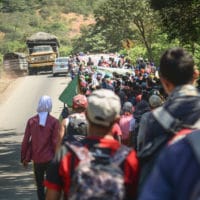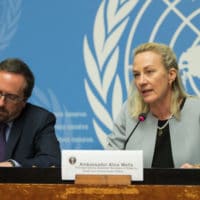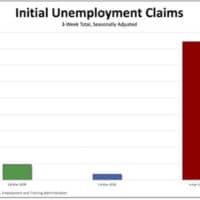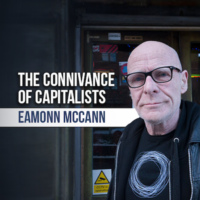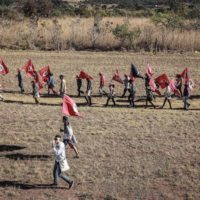-
Standing Rock Sioux Tribe Prevails as Federal Judge strikes down DAPL permits
This validates everything the Tribe has been saying all along about the risk of oil spills to the people of Standing Rock. We will continue to see this through until DAPL has finally been shut down. – Jan Hasselman
Attorney, Earthjustice -
Trump, neo-fascism, and the COVID-19 Pandemic
The world is now in what scientists are calling a no-analogue situation. The dangers are increasing and so is the space for revolutionary human development, calling for a new Earth movement. If humanity is to survive a renewed struggle for freedom as necessity.
-
Understanding vaccines during COVID-19
Dr. Jo Anne Welsch, currently working on vaccine development for low and middle income countries at a global health organization, discusses how vaccines are developed and tested, and the implications of the process for the coronavirus.
-
John Pilger: Can we trust our governments in what they say to us about Coronavirus? No, we can’t, absolutely not!
On this episode of Going Underground, we speak to legendary journalist and film-maker John Pilger about the Coronavirus (COVID-19) pandemic.
-
‘The gig economy is really just pushing people into precarious work’
CounterSpin interview with Bama Athreya on the gig economy and Covid-19
-
Pandemic and socialism
As COVID-19 grips the world, in country after country, there is socialization of healthcare and of production of some essential goods, which markedly departs from the capitalist norm
-
Colombia’s government acts like a doormat for the United States—and its people aren’t going along with it
With the U.S. government now absurdly saying that Venezuela is the source of narco-trafficking, even though all evidence pointing to narco-trafficking is rooted in Colombia, the pressure on Colombia to deal with its drug problem is now lifted.
-
Could COVID-19 bring down the U.S. empire?
With the U.S. failing and China taking a leadership role in the international response to this crisis, could the COVID-19 crisis mark a turning point in the transition to a multipolar world in which China will be just as important as a world leader as the United States?
-
Don’t threaten Afghans—it will be counterproductive
The principal deputy assistant secretary at the Bureau of South and Central Asian Affairs (SCA) in the U.S. State Department, Alice Wells, dropped a bombshell on the Afghan government and the country’s political elites on April 4—and caught the international donors by surprise, too—by linking all aid to Afghanistan to the formation of an inclusive government in Kabul.
-
The Federal Reserve’s Coronavirus Crisis Actions, explained (Part 4)
Ten days after the last central bank swap line announcement, the Federal Reserve followed up with an announcement of another facility meant to help a lower tier of central banks. In this facility the Federal Reserve would make a standing offer to temporarily purchase U.S. treasury securities from central banks (and supranational monetary institutions) and sell them back to them the following day.
-
Chart of the day
All told, more than 16 million American workers have filed initial claims during the past three weeks.
-
As Coronavirus spread, financial services contractor told warehouse workers they aren’t allowed to get sick
M. WAS MIDWAY through her 12-hour shift in late March, sorting financial documents in a cavernous Long Island warehouse, when a supervisor stopped by and handed her a flyer. Several days earlier, New York Gov. Andrew Cuomo had signed an executive order shutting down most businesses, but M.’s warehouse had remained open because its purpose–mailing and shipping–was defined as essential.
-
University workers must not accept wage cuts in exchange for ‘job security’
The government, university bosses and national officials of the National Tertiary Education Union are combining to attack uni workers’ pay and conditions.
-
Femicide does not respect the quarantine
Days, weeks, months, an indeterminate amount of time as the world seems paralysed by the journey of SARS-CoV-2. The lack of certainty increases the anxiety. This virus, as Arundhati Roy writes, ‘seeks proliferation, not profit, and has, therefore, inadvertently, to some extent, reversed the direction of the flow [of capital].
-
Erich Fromm’s Marxist Sociology forty years later
Erich Fromm (1900-1980), who passed forty years ago March of this year, was a leading Marxian sociologist who made considerable contributions to U.S. sociology and to U.S. Marxism. Best known for books such as Escape from Freedom, The Sane Society, and The Art of Loving, Fromm’s account of authoritarianism and critique of mid-twentieth century “consumer capitalism” influenced millions both inside and outside of academia.
-
The connivance of capitalists
Socialist ideas have been jeered and sneered at by the same establishment now faced with the consequences of their profit driven contempt. We should be done with those bellowing cheerleaders of capitalism, argues Eamonn McCann.
-
Adolf Trump goes for Venezuela: A jump into nothingness?
In the midst of a desolate scenario, when the United States has become the country with the highest number of those infected by the Coronavirus, President Donald Trump and his team of serial criminals like Elliott Abrams, Cuban-American Mauricio Claver-Carone, Marco Rubio and others, announced that their country and 22 other nations would launch a far-reaching operation against drug trafficking in the Western Hemisphere, deploying naval and air force military reinforcements in the Caribbean Sea and the South Pacific.
-
A note from Michael D. Yates
Killers rule us. Trump, Pence, Kushner, and all the others. What can we call them but murderers? If actions speak louder than words, then they are screaming at us, “Die, we don’t care.”
-
The Green New Deal and the State: Lessons from World War II—Part I
There is growing interest in a Green New Deal, but far too little discussion among supporters about the challenging nature of the required economic transformation, the necessary role of public planning and ownership in shaping it, or the strategies necessary to institutionalize a strong worker-community voice in the process and final outcome.
-
Dossier 27: Popular agrarian reform and the struggle for land in Brazil
The land question is central to understanding political life and society in Brazil. The country has enormous landed estates, known as latifundios, which have their roots in the beginning of the Portuguese occupation of this part of South America at the start of the 16th century. The Portuguese seizure of this land and its conversion into large latifundios–together with the mono-cultivation of crops for export and the enslavement of human beings–established the roots of social inequality that persist to this day.







